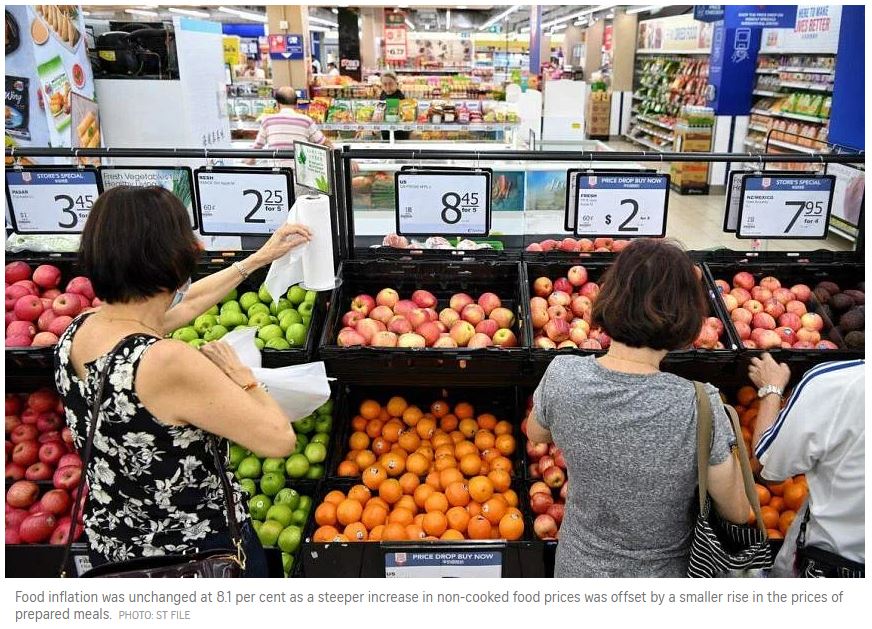Singapore core inflation holds firm at 14-year high of 5.5% in February
SINGAPORE – Core inflation may have held firm in February after a faster rise in electricity and retail prices offset a slower increase in services costs, but some analysts believe respite is in sight amid the global banking turmoil.
Core consumer prices, which exclude private transport and accommodation costs, and reflect the expenses of Singapore households more accurately, went up 5.5 per cent year on year in February, unchanged from January. Still, the figure is the highest since November 2008.
The February figure is lower than the 5.8 per cent expected by analysts in a Bloomberg poll.
Core inflation picked up in January, after it plateaued from October to December, partly due to the higher goods and services tax that had just kicked in. Before October, it went up for eight straight months.
The headline consumer price index, or overall inflation, eased to 6.3 per cent in February from January’s 6.6 per cent, below analysts’ forecast of 6.4 per cent, the Monetary Authority of Singapore and the Ministry of Trade and Industry said on Thursday. This was led by lower private transport inflation.
The official projections for the year remain unchanged at between 5.5 per cent and 6.5 per cent for headline inflation, with core inflation forecast at between 3.5 per cent and 4.5 per cent. These estimates take into account the GST increase from 7 per cent to 8 per cent from Jan 1.
Maybank economist Chua Hak Bin said inflation may fall a lot more quickly in the coming quarters as tightening credit conditions and rising short-term interest rates dampen investment and consumer spending.
That said, Dr Chua believes inflation will remain sticky downwards and well above MAS’ comfort zone.
This means that MAS will likely have to tighten monetary policy again at its April meeting to combat price pressures.
The banking crisis will, however, have a deflationary impact on growth and prices, Dr Chua noted.
“Systemwide loan growth in Singapore is already contracting, led by falling business loans. The banking crisis and tightening credit conditions will likely cool the tight labour market and wage cost pressures,” he said.
But Barclays economist Brian Tan said February’s core inflation is “surprisingly stable” as airfares decline sharply and sequential price increases moderate significantly.
He thinks that with core inflation more clearly undershooting MAS’ projections, “we maintain our base case for no further foreign exchange policy tightening in 2023”.
MAS and MTI said there are upside risks to the inflation outlook, including from fresh shocks to global commodity prices and more persistent-than-expected external and domestic sources of inflation.
Electricity and gas went up the most, at 12.1 per cent in February from 11.5 per cent in January, led by a larger increase in electricity costs.
Retail and other goods were the only other category that edged up. Higher tobacco excise duty and a faster pace of price hikes in personal care products, as well as recreational and cultural goods, meant that retail inflation rose to 3.8 per cent in February, up from 3.3 per cent in January.
Private transport inflation eased the most, easing to 12.1 per cent from 14.3 per cent in January due to a smaller increase in car prices and a decline in petrol prices.
Services inflation eased slightly to 3.9 per cent on the back of lower airfares, while accommodation edged down as housing rents rose at a slower pace.
Food inflation was unchanged at 8.1 per cent as a steeper increase in non-cooked food prices was offset by a smaller rise in the prices of prepared meals.
Source: https://www.straitstimes.com/business/singapore-core-inflation-holds-firm-at-55-in-february


 Thailand
Thailand




